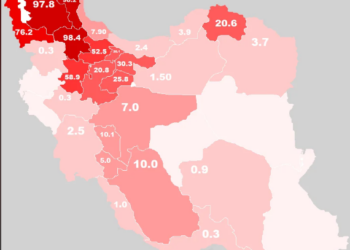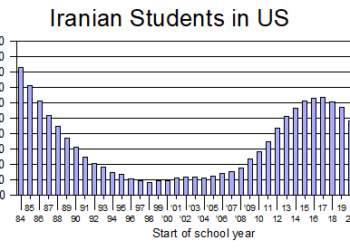The Fars news agency last month ran a story saying documents recently released in the United States by the National Security Archive proved the Americans “supported the use of chemical weapons against Iran by the former Iraqi regime.”
 The National Security Archive, based at George Washington University in Washington, DC, has indeed published numerous documents on the chemical issue during the Iran-Iraq war. But they were collected and published in 2003, not “recently,” as Fars said, and they actually show the United States opposing Iraqi chemical use.
The National Security Archive, based at George Washington University in Washington, DC, has indeed published numerous documents on the chemical issue during the Iran-Iraq war. But they were collected and published in 2003, not “recently,” as Fars said, and they actually show the United States opposing Iraqi chemical use.
The Fars article focuses on one document, dated March 14, 1984, in which the US State Department discussed a draft UN Human Rights Commission resolution proposed by Iran to condemn Iraq for using chemical weapons and urged that the resolution be sidetracked. The Fars story says this proves Washington supported chemical weapons being used against Iran.
But the Fars story ignores the fact that nine days before proposing sidetracking the Iranian draft, the US State Department issued a press statement on March 5 that began: “The United States has concluded that the available evidence indicates that Iraq has used lethal chemical weapons. The United States strongly condemns the prohibited use of chemical weapons wherever it occurs. There can be no justification for their use by any country.
The March 14 telegram that Fars focuses on doesn’t make clear why the State Department decided to oppose the Iranian draft, though it was probably simply to prevent Iran from having any political victory. The telegram makes clear that in opposing the Iranian resolution US diplomats should “underscore” the US condemnation of Iraqi chemical. The one explanation the telegram gives for opposing the Iranian draft is the procedural argument that “the UN Human Rights Commission is an inappropriate forum for matters dealing with chemical weapons.”
It is especially curious that the Fars news agency, which is widely believed to be linked to the Pasdaran, should have focused on the March 14 telegram given that that was the very month the United States chose to condemn Iraq for using chemical weapons.
The published documents show that the State Department had avoided saying anything critical about Iraq for months. It was trying to smooth relations with Iraq at the time and was tiptoeing carefully in everything it said publicly. The documents show it was avoiding any public comment about Iraq’s use of chemical weapons because it thought it had a better chance to convince Iraq to stop by using quiet diplomacy. The documents show warnings were given to Baghdad in November 1983, December 1983 and February 1984. But the Americans were repeatedly rebuffed and decided to go forward with a public condemnation on March 5—the public condemnation that Fars consciously chose to ignore.
It was shortly after that that former US Defense Secretary Donald Rumsfeld was sent to Baghdad to try again to improve relations. A briefing memo for Rumsfeld opens by saying, “Bilateral relations were sharply set back by our March 5 condemnation of Iraq for CW [chemical weapons] use.”
The Fars story cited a second document reporting a meeting between the Iraqi ambassador to the US, Nizar Hamdoon, and James Placke, the US deputy assistant secretary of state. The Fars article correctly reports that Hamdoon asked in that meeting for US help in sidetracking another resolution proposed by the Dutch on chemical weapons.
But Fars ignored another part of that same telegram, in which Placke informed Hamdoon that the US government had decided to forbid the export to either Iraq or Iran of five chemicals used in chemical weapons. “Placke mentioned two instances in which Iraqi shipping agents had sought to purchase such chemicals and we had stopped the sale.… We will not license chemicals to either belligerent and believe it is in the best interests of both USG [United States Government] and GOI [Government of Iraq] if Iraq makes no further efforts to purchase these chemicals. We do not want this issue to dominate our bilateral relationship nor to detract from our common interest to see war brought to early end. Placke hoped Hamdoon would recommend to GOI take action on these requirements, so that no further consideration would be needed.”
Days after this, President Ronald Reagan signed National Security Decision Directive 139 on US policy on the war. That document was driven by concern that Iran might soon win the war. The document concluded: “The Secretary of State, in coordination with the Secretary of Defense and the Director of Central Intelligence, will prepare a plan of action designed to avert an Iraqi collapse.… The Secretary of State will ensure that the policy of the United States Government condemning the use of chemical weapons (CW) munitions in the Iran-Iraq war is unambiguous and consistent with he 1925 Geneva protocol. Our condemnation of the use of CW munitions by the belligerents should place equal stress on the urgent need to dissuade Iran from continuing the ruthless and inhumane tactics which have characterized recent offensives.” This document remained classified Top Secret until August 1994.
Below is the full text of the Fars news agency story.
Documents Reveal Washington’s Support for Iraq’s Chemical Attacks on Iran
TEHRAN (FNA)- New documents recently disclosed by the US National Security Archive revealed that Washington had supported the use of chemical weapons against Iran by the former Iraqi regime.
The documents show that Washington attempted to block a resolution proposed by Iran to condemn the use of chemical weapons by Iraq.
In 1984, Iran submitted a draft resolution asking the UN to condemn Iraq’s use of chemical weapons during the imposed war by Baghdad on Tehran.
According to the released document, the US ordered its delegate to the UN to “work to develop general Western position in support of a motion to take no decision” on Iran’s draft.
If the attempts failed, the delegate was ordered to abstain from voting on the issue.
On March 29, 1984, then Head of Iraq’s Interests Section Nizar Hamdoon informed then US Deputy Assistant Secretary of State James Placke that “Iraq strongly preferred a Security Council presidential statement to a resolution… but to not identify any specific country as responsible for chemical weapons use,” the document read.
A day later, the UN Security Council issued a presidential statement condemning the use of chemical weapons, without naming Iraq as the offending party.
This is while a number of chemical-warfare instances reported by Iran have been verified by an international team of specialists dispatched to the Islamic Republic by the UN.


















